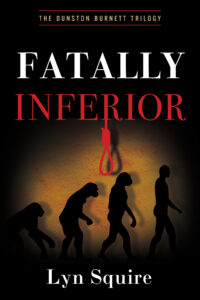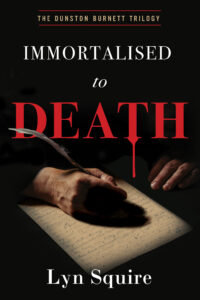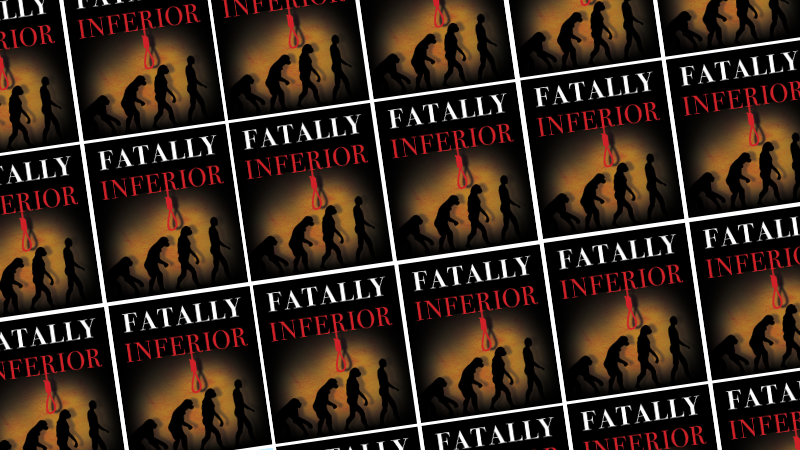A Victorian tale of biblical, eye-for-an-eye revenge
 SPRINGFIELD, VA – In “Fatally Inferior” (Level Best Books, December 10, 2024), award-winning author Lyn Squire delivers another gripping, period mystery. When a member of Charles Darwin’s household goes missing and a former maid dies in childbirth (or so it seems), reluctant detective Dunston Burnett is thrust into a twisted web of deception, revenge, and murder.
SPRINGFIELD, VA – In “Fatally Inferior” (Level Best Books, December 10, 2024), award-winning author Lyn Squire delivers another gripping, period mystery. When a member of Charles Darwin’s household goes missing and a former maid dies in childbirth (or so it seems), reluctant detective Dunston Burnett is thrust into a twisted web of deception, revenge, and murder.
Set against the backdrop of Victorian England, Dunston, a mild-mannered retired bookkeeper, must confront enemies with motives as complex as the theories of evolution themselves. The investigation takes him from the halls of Down House, Darwin’s home in Kent, to the shadowy streets of London, where every clue brings him closer to a chilling truth.
Squire masterfully blends fact with fiction, weaving a narrative rich in period detail while keeping readers on the edge of their seats. Fans of intricate plots, atmospheric settings, and richly developed characters will be captivated by this second Dunston Burnett mystery. With its tantalizing blend of real nineteenth-century figures and a devilish mystery, “Fatally Inferior” is a must-read for lovers of historical whodunits.
“Fatally Inferior”
Lyn Squire | December 10, 2024 | Level Best Books | Period Mystery
Paperback | 978-1-68512-783-1 | $16.95
Ebook | 978-1-68512-784-8 | $5.99
“A layered and fast-paced mystery that also takes time to explore the importance of Darwin’s work.”
– Kirkus Reviews
“Dunston Burnett is back for a second time, now pulled into an investigation of a missing person in the household of Charles Darwin. The intrigue becomes as thick as pea soup or English fog and Burnett desperately tries to track down a merciless killer bent upon revenge. ‘Fatally Inferior will leave you spent and exhausted and is not to be missed. Read the book.’”
– Matt Cost, award winning author of sixteen histories and mysteries, including the Mainely Mysteries, the Clay Wolfe Trap Mysteries, and the Brooklyn 8 Ballo Mysteries.
“If you’re in the market for a good, old-fashioned mystery and you enjoy traveling to different places and different times, you won’t do better than Lyn Squire’s latest, Fatally Inferior. Squire has gifted us with a fast-paced, historical crime novel set in England smack in the middle of the Victorian Age. While sprinkling in actual historical figures like Charles Darwin and the controversy born of his seminal book, Origin of the Species, Squire draws us into a mystery filled with enough twists and turns that keeps us turning the pages.”
-Charles Salzberg, 3-time Shamus Award nominee and author of Second Story Man and Man on the Run
‘Lyn Squire continues his highly original Dunston Burnett mystery series with a tale worthy of Willkie Collins himself. Burnett investigates the strange disappearance of Charles Darwin’s daughter-in- law. There are some terrific twists and turns as the compelling plot unfolds. Beautifully written and populated with some great characters, Fatally Inferior is a wonderful read!’
-Mark Ellis, author of the acclaimed Frank Merlin London wartime detective series.
 Immortalised to Death (Book 1)
Immortalised to Death (Book 1)
Ebook: 978-1-68512-359-8 $5.99 | Paperback: 978-1-68512-358-1 $16.95
Death strikes England’s foremost novelist Charles Dickens, his latest tale only half told. Was he murdered because someone feared a ruinous revelation? Or was it revenge for some past misdeed? Set in the Kent countryside and London slums of 1870, Lyn Squire’s “Immortalised to Death” reveals the ending to Charles Dickens’s unfinished “The Mystery of Edwin Drood”, while diving deep into Dickens’ evolving and ultimately tragic double life.
Debut author Lyn Squire kicks off his electrifying Dunston Burnett Trilogy with legendary Victorian novelist Charles Dickens dead at his desk, pen still in hand. The mystery unravels as Dickens’ nephew and unlikely detective Dunston Burnett, tries to find the solution of his uncles’ unfinished novel. Convinced that the identity of Dickens’ murderer lies in the book’s missing conclusion, Dunston becomes obsessed with investigating those closest to Dickens. A stunning revelation crowns this tale about the mysterious death of England’s foremost novelist, and the long-held secret hidden in his half-finished manuscript.
The deft plotting will remind readers of Agatha Christie and the evocative prose will have them questioning which parts of the book are fiction and nonfiction. Squire seamlessly reimagines Dickens’ untimely death and final unfinished story while tying it neatly into a thrilling whodunnit. Is Dunston Burnett, a diffident, middle-aged, retired bookkeeper, able to crack the case of his uncle’s murder, or does he only find buried secrets in his brilliant continuation to Dickens’ novel.
 LYN SQUIRE was born in Cardiff, South Wales. He earned his bachelor’s degree at the University of Wales, his master’s at the London School of Economics and his doctorate at Cambridge University. Lyn is now an American citizen living in Virginia. During a twenty-five year career at the World Bank, Lyn published over thirty articles and several books within his area of expertise. Lyn also served as editor of the Middle East Development Journal for over a decade, and was the founding president of the Global Development Network, an organization dedicated to supporting promising scholars from the developing world.
LYN SQUIRE was born in Cardiff, South Wales. He earned his bachelor’s degree at the University of Wales, his master’s at the London School of Economics and his doctorate at Cambridge University. Lyn is now an American citizen living in Virginia. During a twenty-five year career at the World Bank, Lyn published over thirty articles and several books within his area of expertise. Lyn also served as editor of the Middle East Development Journal for over a decade, and was the founding president of the Global Development Network, an organization dedicated to supporting promising scholars from the developing world.
Lyn has always been an avid reader of whodunits and has reviewed scores of mysteries for the City Book Review (Sacramento, CA), but it was the thrill of solving Charles Dickens’s unfinished ‘Mystery of Edwin Drood’ that convinced him to put aside his development pen and turn to fiction. Finding a solution to the mystery has attracted massive interest since the author’s death in 1870. A 1998 bibliography lists over 2,000 entries, with continuations ranging from the obvious (a Sherlock Holmes pastiche) to the absurd (The Mysterious Mystery of Rude Dedwin). Lyn’s version of what happened to Edwin is revealed in his first novel, Immortalised to Death. The adventures of his protagonist, Dunston Burnett, a non-conventional amateur detective, continue in Fatally Inferior and The Séance of Murder, the second and third stories in The Dunston Burnett Trilogy. Find more about Lyn on his website.
Praise for Lyn Squire and “Immortalised to Death”
“The novel is a delightful piece of reimagined history set against a backdrop of locations and characters that would make Dickens proud.”
– Kirkus reviews
“The writing style imitates Dickens’s, with frequent descriptive embellishments, exuberant wordplay, and rhythmic, alliterative phrasing…”
– Foreword reviews
“‘Immortalised to Death’s’ ingenious solution to fiction’s most celebrated unfinished mystery holds the key to the secret life, and murder, of legendary author, Charles Dickens himself. This novel’s cleverly wrought combination of fact and fiction will grip fans of historical mysteries from the opening death scene to the last astounding revelation.”
– Herta Feely, award-winning author of “Saving Phoebe Murrow” and founder of Chrysalis Editorial
In an interview, Lyn Squire can discuss:
- The importance of historical accuracy when referencing real people, and the process Squire undertook to ensure the accuracy of his books
- His decision to focus book two around Charles Darwin’s theory of evolution
- His upbringing in South Wales and how his childhood in the UK influenced his writing
- How book one in the series was inspired by a story contest of everyday readers and writers trying to finish / “solve” Dickens’ last mystery story “Mystery of Edwin Drood”
- The widespread fascination with Dickens’ death and last novel, and how Squire worked to uphold Dickens’ legacy with his book
An Interview with Lyn Squire
How did the thrill of reimagining the ending of “Mystery of Edwin Drood” lead you to the main idea for “Immortalised to Death”?
It was a process. Once the excitement of my Eureka moment had passed, my first thought was to write up my solution as non-fiction and be done with it. But then, the more involved I became, the more I saw that my ending to Dickens’s mystery, the only one he ever wrote, suggested an overarching story-line encompassing the author’s liaison with Ellen Ternan and the much-debated question about a possible offspring from that illicit union.
To what extent is historical accuracy important to you and your writing process? What did the research look like for “Immortalized to Death”?
Historical accuracy is not a must for me. If one is writing fiction, then surely it is acceptable to adapt incidents and descriptions to fit a story’s needs. That said, I do try to stay close to the facts. For instance, I visited Gadshill Place, Dickens’s home in Kent, to make sure that the book’s description of his home was as faithful to the original as possible. For me, though, the goal is to provide readers with a convincing impression of place and time, and not overwhelm them with detail.
How did you decide to focus book two around Charles Darwin’s theory of evolution?
I built the book around two aspects of Charles Darwin’s life. On The Origin of Species created a furor in England, pitting religious traditionalists against an emerging breed of empirical scientists. Darwin was bombarded with scathing reviews in academic journals, blistering editorials in the leading newspapers and crude cartoons in the cheaper broadsheets. It is this avalanche of disgust and hatred that prompted my inclusion of threats against his work and his family in Fatally Inferior. The other aspect was his relationship with his wife, Emma. They were first cousins. In the nineteenth century, the offspring of marriages between such close relatives were thought to suffer from loss of vigour and even infertility. This led to the idea of a couple desperate for a grandchild but cruelly robbed by tragedy of any hope of a happy old age spent in the joyful company of their children’s children.
What did the research look like for book two compared to book one?
Much the same actually. I followed a similar program: reviewing online material about Victorian England for background; reading Darwin’s major works, including his autobiography, and several biographies; and visiting Down House in Kent where he wrote ‘On the Origin of Species.
What’s next for you as a writer?
I’m two thirds of the way through ‘The Dunston Burnett Trilogy’. The third book — ‘The Seance of Murder- — is nearing completion and will be published in late 2025 or early 2026. It is a story of greed set against the spiritualist movement that swept through England and America in the late 19th century.

A former award-winning journalist with national exposure, Marissa now oversees the day-to-day operation of the Books Forward author branding and book marketing firm, along with our indie publishing support sister company Books Fluent.
Born and bred in Louisiana, currently living in New Orleans, she has lived and developed a strong base for our company and authors in Chicago and Nashville. Her journalism work has appeared in USA Today, National Geographic and other major publications. She is now interviewed by media on best practices for book marketing.


